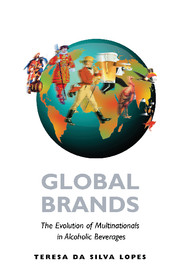Book contents
- Frontmatter
- Contents
- List of Illustrations
- List of Figures
- List of Tables
- Series Editors' Preface
- Preface
- List of Abbreviations
- 1 Brands and the Evolution of Multinationals
- 2 Leading Firms – The Historical Legacy
- 3 Growth and Survival
- 4 Family Ownership and Managerial Control
- 5 Channel Management
- 6 Diversification Strategies
- 7 Acquiring Brands
- 8 The Life of Brands
- 9 Conclusion
- Appendix 1 Value-Added Chain in Alcoholic Beverages
- Appendix 2 Brands Owned by the Leading Multinationals in 2005
- Appendix 3 Annual Sales for Each Firm in Alcoholic Beverages
- Appendix 4 Selection of the Sample
- Appendix 5 Biographies of the World's Largest Multinationals in Alcoholic Beverages
- Appendix 6 Types of Governance Structures in Distribution, 1900–2005
- Appendix 7 Schematic Representation: Alliances as Dynamic Processes for Acquiring Marketing Knowledge
- Appendix 8 Diversification Strategies
- Appendix 9 Patterns of Diversification within Alcoholic Beverages
- Appendix 10 Schematic Representation: Brands and Marketing Knowledge in Mergers and Acquisitions
- Appendix 11 Evolution of Sales of the World's Leading Brands by Beverage Type
- Bibliography
- Index
- Plate section
Appendix 5 - Biographies of the World's Largest Multinationals in Alcoholic Beverages
Published online by Cambridge University Press: 10 December 2009
- Frontmatter
- Contents
- List of Illustrations
- List of Figures
- List of Tables
- Series Editors' Preface
- Preface
- List of Abbreviations
- 1 Brands and the Evolution of Multinationals
- 2 Leading Firms – The Historical Legacy
- 3 Growth and Survival
- 4 Family Ownership and Managerial Control
- 5 Channel Management
- 6 Diversification Strategies
- 7 Acquiring Brands
- 8 The Life of Brands
- 9 Conclusion
- Appendix 1 Value-Added Chain in Alcoholic Beverages
- Appendix 2 Brands Owned by the Leading Multinationals in 2005
- Appendix 3 Annual Sales for Each Firm in Alcoholic Beverages
- Appendix 4 Selection of the Sample
- Appendix 5 Biographies of the World's Largest Multinationals in Alcoholic Beverages
- Appendix 6 Types of Governance Structures in Distribution, 1900–2005
- Appendix 7 Schematic Representation: Alliances as Dynamic Processes for Acquiring Marketing Knowledge
- Appendix 8 Diversification Strategies
- Appendix 9 Patterns of Diversification within Alcoholic Beverages
- Appendix 10 Schematic Representation: Brands and Marketing Knowledge in Mergers and Acquisitions
- Appendix 11 Evolution of Sales of the World's Leading Brands by Beverage Type
- Bibliography
- Index
- Plate section
Summary
This Appendix contains brief biographies of the world's largest multinationals in alcoholic beverages at the beginning of the twenty-first century. In complex cases the historical evolution is illustrated by a graph.
Allied Domecq (See Figure A5.1) Allied Breweries was founded in 1961 through the merger of three major U.K. brewers – Ind. Coope, Tetley Walker, and Ansells Brewery – to produce and distribute three brands of beer (Double Diamond, Skol, and Long Life) as well as wines and spirits, thus becoming Britain's second largest brewer. In 1968, it acquired Showerings, a wine and cider company, owner of Babycham, which had also acquired Harveys of Bristol in 1966. Since then, Allied Breweries grew rapidly, essentially through international mergers and acquisitions. Two major examples are the acquisition of Hiram Walker from Canada in 1986, and in 1994, Pedro Domecq, the leading Spanish spirits and sherry firm that also had a prominent position in South America. Over time, Allied Domecq divested its nonalcoholic beverages and beer business. By the beginning of the twenty-first century, this multinational was pursuing a strategy of concentration in the spirits and branded wines businesses. It owned a number of top spirits brands such as Ballantines, Beefeater, Courvoisier, Hiram Walker, Kahlua, Sauza, and Malibu. In 2005, Allied Domecq was acquired by Pernod Ricard. Fortune Brands bought some of Allied Domecq's brands from Pernod Ricard.
- Type
- Chapter
- Information
- Global BrandsThe Evolution of Multinationals in Alcoholic Beverages, pp. 218 - 231Publisher: Cambridge University PressPrint publication year: 2007

